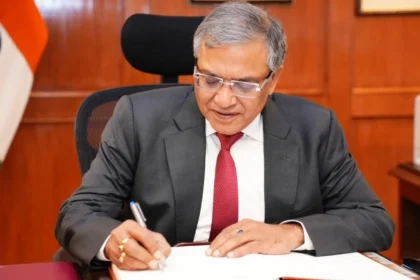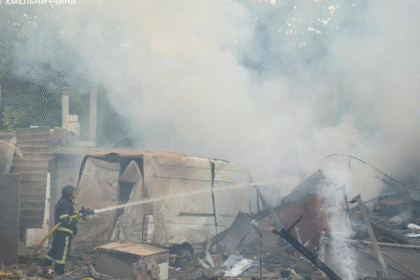US Envoy-Designate to India Says Halting Russian Oil Imports Is Top Priority Amid Senate Scrutiny
New Delhi: Sergio Gor, US ambassador-designate to India, told senators on Thursday (September 11) that persuading New Delhi to halt purchases of Russian crude was a “top priority” for the administration, amid bipartisan concern that India’s energy ties with Moscow are fuelling the war in Ukraine.
US President Donald Trump had last month announced the nomination of the 38-year-old senior White House director of Presidential Personnel as ambassador to India and special envoy for South and Central Asia.
Introducing Gor at the hearing, Secretary of State Marco Rubio described India as “one of the top relationships the United States has in the world today in terms of the future of what the world’s gonna look like.” He told senators that “the 21st century… is gonna be written in the Indo-Pacific,” with India “at the core of that.”
Rubio argued that New Delhi needed an envoy with direct access to the Oval Office and said Gor’s closeness to Trump made him uniquely suited.
“Having a representative in a place like India that has direct access to the president, and who they know can get things done both in the administration and through the Oval Office, is critically important,” he said.
The move came against the backdrop of strained ties following the imposition of 50% tariffs on Indian imports – the highest rate applied to any country along with Brazil. Half of this was levied as ‘reciprocal’ trade tariffs, now under negotiation as part of a potential deal between India and the US. The other 25% was imposed as punishment for India’s purchases of Russian oil, a measure New Delhi deemed unfair since China, the US and Europe were also continuing to buy Russian energy.
Gor insisted that Washington was pressing India hard on the issue. “Getting India to stop buying Russian oil is a top priority for this administration,” he said, stressing that almost every senator on the panel had already co-sponsored legislation for much harsher tariffs.
“President Trump has been crystal clear on this. They must stop buying Russian oil,” he said. “The president has only imposed a 25% tariff, and he’s fully encouraging our European partners and others around the world to stop. Our tariffs work if our partners around the world are on the same page. If we’re unilaterally putting tariffs on someone but they’re able to buy the same oil and resell it through China, through India, through Brazil, that’s a problem, and we fully intend on fixing that”.
That line echoed throughout the two-hour session of the Senate Foreign Affairs Committee, where lawmakers returned again and again to the issue of discounted Russian crude.
Republican senator Bill Hagerrty described what he called a “circular transaction network” in which India buys Russian oil, refines it, and sells petroleum products back to Europe.
“We need Europeans to be buying American energy. We need Russia’s flow of funds to be shut down. We need to bring this conflict to an end,” he said, underscoring that the question was not only India’s actions but also the need for US allies to align with Washington.
Committee members also invoked the recent Shanghai Cooperation Organisation summit in Beijing, where Modi was photographed alongside Putin and Chinese President Xi Jinping.
“I was very concerned… when I saw Prime Minister Modi standing alongside Vladimir Putin and Xi Jinping,” said Ranking Democrat member Senator Jeanne Shaheen said, calling it “a serious setback to US interests” and pressing Gor on how he would rebuild trust with New Delhi.
Republican senator says China used an electromagnetic weapon to ‘literally melt Indian soldiers’
In response, Gor urged against over-interpretation of summit optics, pointing to longstanding hostility between India and China. “India shares a lot more in common with us than they do with China. And for far too long, we have not had that personal touch,” he said.
Haggerty also had claimed that five years ago, China and India had clashed over their disputed border. “They didn’t use bullets, but they used an electromagnetic weapon to literally melt Indian soldiers. So, I think that it’s clear to me and I think it’s clear to all of us that international relations are a lot more than a photo opportunity,” he added.
Indian and Chinese troops had clashed at Galwan Valley in June 2020, which led to the death of 20 Indian soldiers and at least five Chinese army personnel. It was a hand-to-hand fight, but India has not publicly claimed that China used any other unconventional weapons to kill soldiers.
Still, senators pressed Gor on why India was being singled out for tariff pressure while Beijing, the world’s largest buyer of Russian oil, had not faced the same treatment. Shaheen asked pointedly, “How will you explain the distinction to the Indians about why they have been spared the same kind of tariff treatment from the administration?”
Gor responded that Washington was already in talks with New Delhi for a trade deal. “We’re actively negotiating with the Indians right now. In fact, the President has invited their Commerce and their Trade Ministers to come visit us next week and they’ll be meeting with [United States trade representative] Ambassador [Jamieson] Greer here in Washington,” he said.
He argued that Washington expected more from India than from others. “We hold our friends to different standards. Frankly we expect more from India than we do sometimes from other nations. I do think it will get resolved over the next few weeks,” Gor said.
Gor added that while Trump had so far imposed a 25% tariff, senators themselves had co-sponsored legislation mandating much harsher penalties. The measure, introduced by Senator Lindsey Graham, seeks to impose tariffs of up to 500% on countries that purchase Russian oil, gas and uranium and other products.
“The bill that almost every single member of this committee is a co-sponsor of goes much higher so I think we are all in agreement on that,” he said.
‘Quad is vitally important’
On China, Gor said Trump was willing to expand pressure if required. “As you know with the President, he is very much open to that. He’s spoken about that. In fact, he’s encouraging our European allies to do the same and so I think we are on the same page,” he told senators.
He also sought to reassure the committee that the trade standoff with India was narrowing.
“We’re not that far apart right now on a deal. In fact, they’re negotiating the nitty-gritty of a deal,” Gor said. He added that Trump’s “Mission 500” plan to double bilateral trade to $500 billion by 2030 remained realistic.
Agriculture, he confirmed, was at the top of the agenda.
“One hundred percent. In fact, I’ve got a briefing on this. Ambassador Greer is literally working on individual items that in the past tariffs and barriers have made it prohibitive to be imported into India. That will hopefully be changing soon and over the next few weeks,” he said.
Several senators pressed him on the same point, citing India’s long-standing barriers to imported farm products. One lawmaker noted that a constituent selling popcorn had complained of archaic landholding rules in India that limited farm consolidation. Gor responded that these issues were being addressed in the negotiations.
Beyond trade, Gor said the administration would continue to strengthen defence cooperation, pointing to joint military drills such as last week’s exercises in Alaska involving 500 Indian troops.
Republican Senator Pete Ricketts pressed him on the next Quad summit, expected later this year in India, asking for a commitment to finalising the trade talks while also ensuring the leaders’ meeting moved ahead.
Gor called the Quad “vitally important” and confirmed Trump’s interest. “Without committing to an exact date, Senator, the President is fully committed to continue to meet with the Quad and strengthen the Indians,” he replied.
He added that the partnership had already deepened, despite trade disputes. “In spite of this little hiccup that we have had over tariffs, our relationship is much stronger. It’s built on many more decades,” Gor said.
Asked about India’s place in BRICS alongside China and Russia, Gor admitted to concerns but noted that New Delhi had often acted as a brake on proposals that could weaken the US dollar. “India has been the stopgap… India is much more willing and open to engage with us than with some of those other members of BRICS,” he said.
‘India’s close energy relationship with our adversary Russia is incredibly troubling’
President Trump has taken a hard line on BRICS, threatening a 10% additional tariff on any country that “align[s] themselves with the Anti-American policies of BRICS”. He warned that the group could “end very quickly if they ever form in a meaningful way”. India will take over as the next chair of BRICS in December.
On the broader strategic outlook, he underlined India’s importance in countering China’s influence in the Indo-Pacific. “Being the largest democracy at 1.4 billion, we share a lot more common values with the Indians,” Gor said.
He added that New Delhi valued Trump’s direct approach, “With this president, people know where you stand. The Indians have appreciated that.”
Gor also addressed his dual mandate as ambassador and special envoy for South and Central Asia, a combination that has raised eyebrows in New Delhi. India has long opposed being bracketed with Pakistan in US policy, recalling the Holbrooke episode of 2009 when even a hint of an envoy role covering India, Pakistan and Afghanistan drew strong resistance.
“So I am a special envoy to those 12 nations to complement the ambassadors that we have there… Should we have an issue that arises to a certain level, I have the unique ability… to directly get the president of the United States and raise it to that level.,” he stated.
Looking ahead, the nominee said he would prioritise expanding US energy exports to India and advancing cooperation in artificial intelligence, semiconductors and other critical technologies to counter China. “The possibilities are endless… By our definition, their middle class is larger than the entire United States of America. So we have countless possibilities to expand into those markets, and we fully intend to do that,” he told senators.
For the committee, however, the overriding concern seemed to remain India’s oil trade with Moscow. “India’s close energy relationship with our adversary Russia is incredibly troubling,” said Senate Foreign Relations Committee chair Jim Risch.
Gor acknowledged the concern, telling senators that confronting New Delhi over its energy ties with Russia would be among his first priorities in India.
Also Read: Niger’s Bone Keepers Preserving Dinosaurs to Supercrocs Amid Fossil Heritage Crisis








